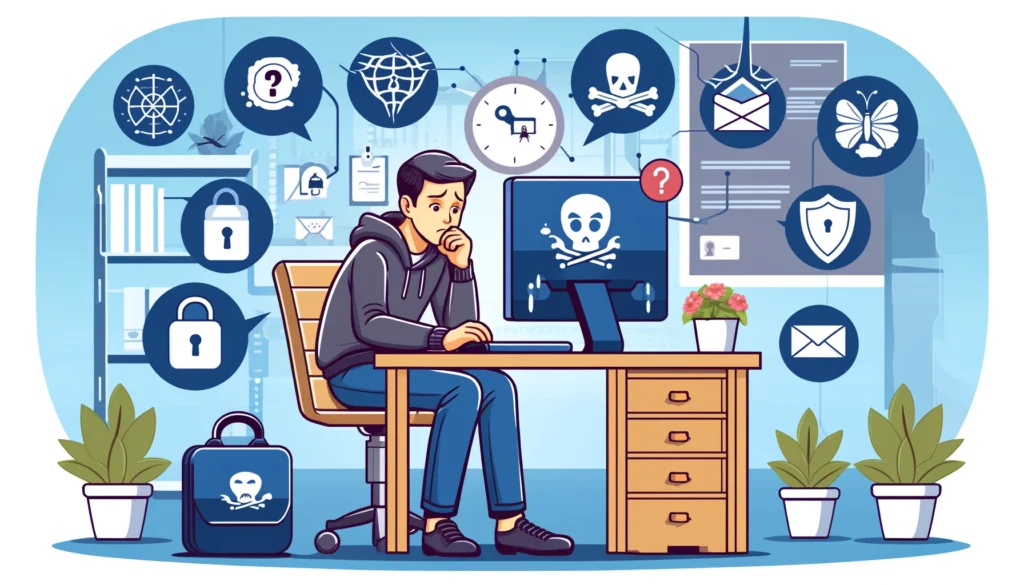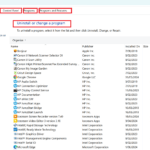Cyber security isn’t just an issue for governments and corporations, but an issue we all face—that’s because the favourite weapon of hackers and terrorists is your computer.
Enemy #1: Your Computer
If you read any report about the latest hacking attack, you’ll hear about “botnets” or “millions of computers”. These are giant collections of computers just like yours which hackers now control.
Hackers don’t buy these computers—they break into them remotely and then they either use them for evil or sell them to someone else who will use them for evil.
Most people don’t realize that their computers have been taken over until days or weeks later. It could be that your computer is no longer completely under your control right now—you just don’t realize it yet. Check this post out showing how to monitor and block ports using netstat command.
Step-by-Step: Check if Your Computer Is Part of a Botnet
-
Open Command Prompt
- Press
Win + R, typecmd, and hit Enter
- Press
-
Check active network connections
- Type
netstat -anoand press Enter - Look for connections labeled “ESTABLISHED” with unfamiliar IP addresses
- Type
-
Cross-check the PID (Process ID)
- Open Task Manager (
Ctrl + Shift + Esc) - Go to the Details tab
- Match the PID from
netstatto see which program is using the connection
- Open Task Manager (
-
Investigate Suspicious Processes
- Look up unknown
.exenames using Google, VirusTotal.com, or even ChatGPT - If the process is unnecessary or malicious, terminate it and run a full system scan
- Look up unknown
What Hackers Do With Your Computer
The easiest type of attack on the Internet is the Distributed Denial Of Service (DDOS) attack. The hacker takes thousands or millions of computers and has each one of them repeatedly try to access a site as fast as possible. Since few sites on the Internet can withstand millions of requests a minute, the site can’t respond to legitimate requests from legitimate customers.
DDOS attacks come in several types. Some require a relatively small number of computers—say 100,000 to take down Google. But these small-scale attacks can be blocked after the company determines which computers are powering the attack.
Another DDOS attack uses large numbers of computers and very basic attacks. In this case it might take up to 10 million computers to take down a site the size of Google. Unfortunately, there’s no cyber security defense against this type of attack. Google’s only options are to buy (or rent) extra servers or to wait for the attack to finish, which usually happens when enough people discover their computers are being used in an attack.
Hackers can also:
- Host illegal content, like child exploitation material
- Run phishing scams and steal identities
- Use your bandwidth and power to mine cryptocurrency
- Turn your system into a spam or malware distribution point
Step-by-Step: Secure Your Computer From Being Used Illegally
-
Install a reputable antivirus and anti-malware scanner
- Recommended: Windows Defender, Malwarebytes, Bitdefender
- Run weekly full system scans
-
Use a firewall
- Press
Win + R, typewf.msc, and hit Enter - Block known exploit ports like 445, 139, and 135 (both inbound & outbound)
- Press
-
Disable file and printer sharing (if you don’t use it)
- Control Panel > Network and Sharing Center > Change advanced sharing settings
- Turn off file and printer sharing
-
Keep your software updated
- Enable automatic updates in Windows and browser settings
- Manually check software that doesn’t auto-update
Beyond The Basic Attack
DDOS attacks are the most basic tool hackers control. And it’s a pretty useless tool—all it can do is force a website offline. Sure that costs the website significant business, but it’s not the worst thing in the world.
There’s far worse hackers can do with your computer—for example, hackers can make a quick buck by using your computer to sell child pornography. It’s an illegal business with high profit margins and if the hacker uses your computer, he doesn’t have to worry about the police seizing his computer.
Hackers will also use your computer to run phising scams and perpetuate fraud.
Unfortunately, when the police discover fraud or child pornography, they rarely look beyond the person who owns the computer perpetuating the crime. If you own the computer, you own the crime.
Is Your Computer Infected Right Now?
As I mentioned, your computer could be infected right now. Hackers prefer you don’t realize that your computer is infected so you don’t try to get it fixed.
But hackers can’t hide all the signs of their activity on your computer. Slow Internet, strange errors, and suspicious disk activity all point to a compromised computer.
If you suspect your computer has been hacked, use your anti-virus software to run a full system scan. You may want to disconnect from the Internet while the scan is running to prevent your computer from being used in an attack in the meantime.
Step-by-Step: What to Do if You Suspect You’ve Been Compromised
-
Disconnect from the internet immediately
- This prevents further communication with malicious servers
-
Reboot in Safe Mode with Networking
- Hold
Shiftwhile clicking Restart > Choose “Advanced Options” > Startup Settings > Safe Mode with Networking
- Hold
-
Run a deep scan
- Use full-scope scanning tools (e.g., Malwarebytes, ESET Online Scanner)
-
Review installed programs and startup items
- Use Task Manager > Startup tab
- Disable unknown or suspicious entries
-
Seek help if needed
- If you’re unsure about a file or process, ask ChatGPT, search forums, or consult a trusted tech expert
Protecting Yourself In Advance
The best way to stay out of jail and avoid gaining a reputation as a terrorist, hacker, or child pornographer is to block hackers from accessing your computer in the first place. Follow the standard advice offered here and from most other experts:
- Don’t install programs without first verifying that they’re free of viruses. The best way to do this is to use a trusted download site which reviews the software before your download it.
- Always run an anti-virus program. It will help catch infected email attachments and it will scan your hard drive regularly to ensure no viruses have infected your computer.
- Always run a firewall. The firewall will block hackers and viruses when they try to connect to your computer directly. The firewall won’t help if you become infected, but it will help keep you from becoming infected in the first place.
- If you see something suspicious on your computer, investigate it. Don’t ignore it and hope it goes away—that’s bad cyber security.
Final Warning
If your computer gets hijacked and used for illegal activities, you may be the one held accountable. That’s not scare-mongering—it’s happening more and more, and law enforcement often starts (and ends) with the IP address and device owner.
The smartest move?
Improve your computer security now, before someone else takes control of your machine.



It is so true that many people have no idea that their computer have been hijacked and is part of a bot network. A good free software to know if your computer is part of a bot network is TrendMicro’s RUbotted bot infection monitor.
Cyber security? It is a highly debatable topic. As we get more and more advanced with the web, we don’t realize that we are exposing ourselves to more and more risk – most of it can’t be even traced (love the movie untraceable, by the way).
Thanks for the nice article Dave.